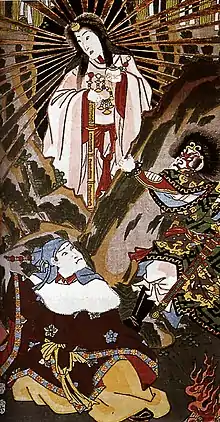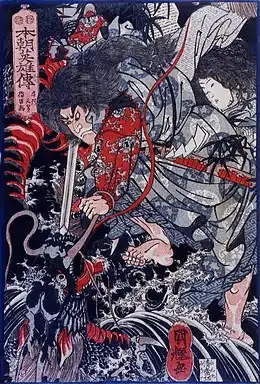Toshigami
Toshigami (年神 or 歳神, Toshigami or Tomo, lit. "year god"), also known as Ōtoshi-no-kami (大年神, lit. "great year god"), is a Japanese kami and a part of the Shinto pantheon.
| Toshigami | |
|---|---|
Harvest, grain | |
| Other names | Ōtoshi-no-kami (大年神) |
| 年神 or 歳神 | Japanese |
| Personal information | |
| Parents |
|
| Siblings | Ukanomitama |
| Consorts |
|
| Offspring | Oyamakui no Kami |
Etymology
The 年 (nen) kanji originally meant "harvest", which became "year" over time as harvest happened once each year. Toshigami was therefore the god of abundant harvests, and specifically of grain or rice.[1][2] The character 神 (kami) literally means "god" or "deity".
Mythology
Parentage and siblings
According to the Kojiki, Toshigami was the son of Susanoo and Kamuōichi-hime and the older brother of Ukanomitama.[1][2]
Family
Toshigami had offspring through three different wives: Ino-hime (伊怒比売), Kaguyo-hime (香用比売), and Amechikarumizu-hime (天知迦流美豆比売).[1] Through Ino-hime, his children include Ohokuni-mitama (大国御魂神), Kara-kami (韓神),[3] Sofuri-kami (曾富理神), Shirahi-no-kami (白日神), and Hijiri-no-kami (聖神). His children by Kaguyo-hime include Ōkaguyama-tomi (大香山戸臣神) and Mitoshi-no-kami (御年神). With Amechikarumizu-hime, he had Okitsu-hiko-no-kami (奥津日子神), Okitsu-hime-no-mikoto (奥津比売命), Oyamakui-no-kami (大山咋神), Niwa-tsuhi-no-kami (庭津日神), Asuha-no-kami, Hahiki-no-kami, Kaguyama-tomi-no-kami (香山戸臣神), Hayamato-no-kami (羽山戸神), Niwataka-tsuhi-no-kami (庭高津日神), and Ōtsuchi-no-kami (大土神).
See also
References
- 大年神 [Ōtoshi-no-kami] (in Japanese). Kokugakuin University. Archived from the original on 5 June 2023. Retrieved 5 May 2023.
- 大年神 [Ōtoshi-no-kami] (in Japanese). Kotobank. Archived from the original on 5 June 2023. Retrieved 5 May 2023.
- 国安洋 (October 1989). 平安時代の「遊び」:「古今和歌集」をめぐって [Playing in the Heian Period: Disputing the "Kokin Wakashū"]. 横浜国立大学人文紀要 第一類 哲学・社会科学 (in Japanese). Yokohama National University. 35: 129–140. ISSN 0513-5621. Archived from the original on 6 June 2023.
External links
 The dictionary definition of toshigami at Wiktionary
The dictionary definition of toshigami at Wiktionary

